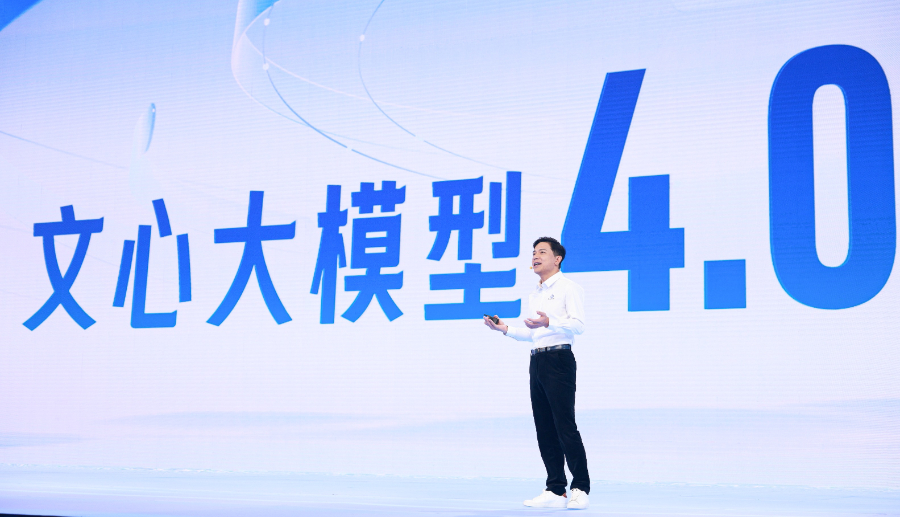ERNIE 4.0 Launched: Robin Li Announces the Dawn of an AI-Native Era
-
"The emergent intelligence from large models forms the foundation for developing AI-native applications," said Robin Li at Baidu World 2023 on October 17. Delivering a keynote titled Step-by-Step Guide to Building AI-Native Applications, Li announced the launch of ERNIE 4.0 and introduced over ten AI-native applications, including new search and map features.
At the conference, Li officially released ERNIE 4.0, now available for invitation-based testing. He highlighted that ERNIE 4.0 features an upgraded foundational model with significant improvements in comprehension, generation, reasoning, and memory capabilities.

Li showcased AI-native versions of Baidu’s core products—such as search, productivity tool Ruiliu, maps, cloud storage, and文库—all rebuilt using ERNIE. He emphasized the goal of "inspiring everyone to create even more impressive AI-native applications."
According to Li, AI-native applications thrive on four core capabilities of large models: comprehension, generation, reasoning, and memory. "These capabilities, unprecedented in previous eras, unlock infinite innovation potential," he noted.

Demonstrating ERNIE 4.0’s prowess, Li illustrated its comprehension by parsing disordered, ambiguous, or implied prompts. For generation, ERNIE produced ad creatives—posters, copy, and a marketing video—within minutes from a single image. This capability powers Baidu’s AIGC marketing platform, Qingduo, enabling "a single person to function as an entire AI-driven marketing team."
Further, ERNIE’s reasoning was tested through math problems and knowledge summarization, while its memory shone in crafting multi-thousand-word novels with intricate plots. A digital doctor interpreting medication instructions showcased the integration of all four capabilities.
"These demonstrations reflect ERNIE’s advancements in comprehension, generation, reasoning, and memory—the bedrock of all AI-native applications," Li concluded.
Over a Dozen AI-Native Applications Unveiled

Robin Li explained that Baidu's new search engine offers three key features: ultimate satisfaction, recommendation stimulation, and multi-turn interaction. When users search for information, it no longer provides just a list of links but generates multimodal answers including text, images, and dynamic charts through content understanding, allowing users to get answers in one step. For complex queries, the "multi-turn interaction" feature can meet more personalized search needs through prompts and adjustments.
Li also showcased Baidu GBI, a generative business intelligence product built with AI-native thinking. Compared to traditional BI software with high barriers to entry and complex data analysis, Baidu GBI can perform data queries and analysis tasks through natural language interaction and supports professional knowledge injection for more complex analytical needs.
By understanding and regenerating massive amounts of documents, images, and videos, Baidu Drive and Docs now have creative capabilities: Drive can not only pinpoint specific frames in videos but also summarize hour-long videos in seconds, extracting key quotes and points. Docs, leveraging its 10 billion high-quality resources, can draft articles and create PPTs, becoming a true "productivity tool."
Baidu Maps and the intelligent office platform Liulian have also evolved into more attentive travel guides and super assistants through understanding and memory capabilities. On Maps, users can simply voice their needs, and the system will utilize thousands of service interfaces to recommend restaurants, compare multiple locations, and provide travel suggestions. Liulian can instantly highlight key points in group chats, and its travel assistant can not only book flights and hotels but also summarize client background information and talking points by integrating with company systems like CRM.
Plugins and APIs Drive Ecosystem Growth and Economic Development
"Large models will usher in a thriving ecosystem of AI-native applications," Li said. Plugins, as a special type of AI-native application, have the lowest barrier to entry and are the easiest to use, enabling developers and entrepreneurs to quickly join the ecosystem. For example, a "smart legal assistant" plugin with access to authoritative legal data can provide users with legal advice, while a resume assistant plugin can generate resume templates with one click.
Personal and enterprise data, capabilities, or applications can quickly become AI plugins, enhancing the utility and usability of large models. Li noted that Baidu's Lingjing Plugin Platform, launched a month ago, has already attracted 27,000 developer applications, covering fields like law, workplace, and education.
When developing AI-native applications, the foundational capabilities of large models are critical. Li explained that APIs are the primary way to call these models. Enterprises and developers can access APIs for models like ERNIE Bot on Baidu's Qianfan Large Model Platform, which currently hosts 42 mainstream large models covering nearly 500 scenarios across industries. Starting today, enterprise clients can also apply to test the ERNIE 4.0 API on the Qianfan platform.
Additionally, Li emphasized that future AI-native applications will be multimodal, extending beyond the digital world to reshape the physical world. Autonomous driving is a prime example of visual large models transforming the physical world. Large models will enable Baidu's autonomous driving systems to surpass experience-based systems, handle complex scenarios more intelligently, and achieve broader spatiotemporal coverage. Currently, Baidu's autonomous ride-hailing service, Apollo Go, has provided over 4 million rides.
"A multitude of AI-native applications will continue to emerge, deeply integrating digital technology with the real economy. Large models are becoming a key driver of new industrialization," Li concluded.
